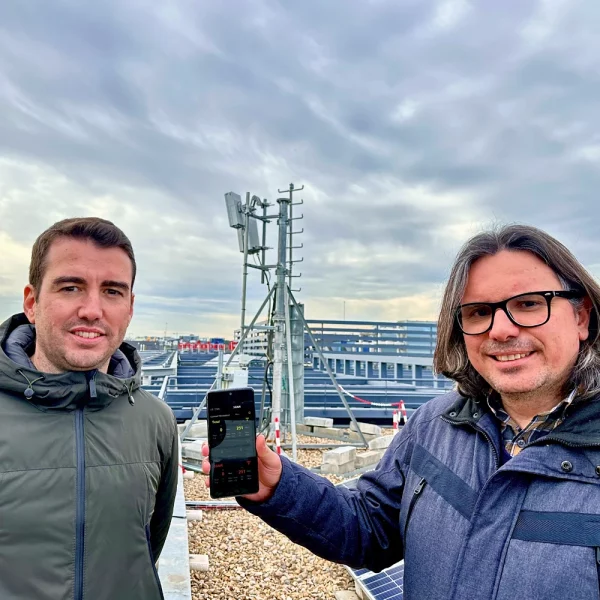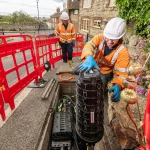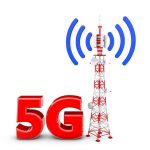Vodafone Test Advanced 5G – Boosts Upload Speed up to 273Mb

British mobile operator Vodafone claims to have conducted the “first European test” of “advanced 5G uplink technology” by harnessing the latest Qualcomm processors and Xiaomi smartphone via their 5G Standalone (5GSA) network, which enabled them to achieve faster mobile broadband upload speeds of “up to” 273Mbps.
At present most existing 5G networks in the UK and elsewhere are still using Non-Standalone (NSA) technology, which rely on some slower 4G infrastructure. By comparison, Standalone (SA) networks are pure end-to-end 5G networks that can deliver improvements such as ultra-low latency times (fast), better upload speeds, network slicing capabilities, better support for Internet of Things (IoT) devices, increased reliability and security.
The latest test builds on that by enhancing the uplink (upload) performance by harnessing a technique called Uplink Carrier Aggregation (UCA) with Tx Switching, which combines multiple transmission channels supported by the smartphone and the mobile antenna. This was paired with the latest silicon technology from Qualcomm (The Snapdragon® 8 Gen 3 Mobile Platform) and the next Xiaomi flagship smartphone.
Advertisement
The tests, which took place in both the Spanish city of Ciudad Real and on their commercial 5G SA network in Hannover (Germany), were able to boost upload speeds 35% to 54%, depending on the distance between the smartphone and mobile site – achieving upload speeds of up to 273Mbps (most NSA 5G networks in the UK today often struggle to get above an average of c.15-20Mbps).
Alberto Ripepi, Chief Network Officer of Vodafone, said:
“We want our customers to be among the first anywhere in the world to benefit from this new 5G feature when it becomes available. That’s why we are working with key partners to lead the industry in pulling together and testing the necessary network, silicon chips and devices to turn it into a reality, all while driving a stronger vendor and developer ecosystem.”
The announcement claims that “most of today’s smartphones and home broadband services are capable of an average upload speed of 100Mbps“, which is a bit of a sweeping generalisation as there’s a lot of variation, depending upon which country / location, operator and network technology you’re talking about (e.g. the best FTTP networks can already do symmetric multi-Gigabit speeds).
Nevertheless, better uplink speeds on mobile connections will naturally come in handy for sharing files, photos, videos and using cloud or remote gaming services etc. Suffice to say that any improvement in this area is welcome, although the complexity of deploying 5G SA and related enhancements suggests it may be a while before we can all benefit.
Vodafone has already launched a 5G SA network in the UK with their “5G Ultra” package for consumers (here), although its coverage is initially limited (e.g. parts of London, Manchester, Glasgow and Cardiff). But the operator, as part of their proposed mega-merger with Three UK, has also pledged to reach more than 99% of the UK population with their 5G SA network by 2034 and to push fixed wireless access (mobile home broadband) to 82% of households by 2030.
Advertisement
The operator’s current 5G SA network in the UK hasn’t yet activated support for the new uplink enhancement mentioned above, but that will no doubt change, particularly as new devices become available that can actually harness it.
Mark is a professional technology writer, IT consultant and computer engineer from Dorset (England), he also founded ISPreview in 1999 and enjoys analysing the latest telecoms and broadband developments. Find me on X (Twitter), Mastodon, Facebook, BlueSky, Threads.net and Linkedin.
« Welsh Broadband ISP Ogi Enhances its Customer Support






















































This is good. Really, but you probably know what im going to say next.
Vodafone hasn’t bothered with 5G at all unless you’re a rich londoner.
They have the least number of 5G sites anywhere, and, if you are (un)lucky enough to actually find Vodafone 5G it’s terrible. I was looking at speeds under 50mbit in multiple locations in central london. Ok these were busy sites, but other networks were leaving Vodafone in the rear-view mirror. Now here out in the forgotten parts of the world (aka outside the M25) there is every network with 5G except for Vodafone. Three in 2019, EE in 2020, O2 in 2021, Vodafone? never. because they don’t care, because it’s not London.
Inb4 where I live I get 8 terrabits per second on Vodafone for £0.50 a month and it’s never failed, always worked, and Vodafone brings me flowers every day.
They’ve added 5G in town where I live in the East Midlands, but I ended up just switching back to 4G because the performance seemed better.
I had what should have been a strong enough signal, maybe I’ll try it again next time I’m in.
I just wish that I could get a decent 4G signal where I live.
Here in the northwest I get 250 Mbps indoors on Vodafone. And when I travel to the east coast have had no problem on that coast either on Vodafone . This is a big country. Don’t let where you are fool you.
“ But the operator, as part of their proposed mega-merger with Three UK, has also pledged to reach more than 99% of the UK population with their 5G SA network by 2034 and to push fixed wireless access (mobile home broadband) to 82% of households by 2030.”
I would love to see their business case for that, because without one it’s all just pie in the sky.
It will cost an absolute fortune to deploy 5G standalone everywhere at scale to reach 99% of the population and without discernible use cases at scale, how exactly would they get a return on that colossal investment?
Couple this with the fact that they have a mountain of debt and are struggling with growing revenues let alone margins, I really am skeptical.
So I sincerely hope that both Ofcom and the competition regulator challenge them on these sort of claims.
There is a very good reason why stand alone hasn’t been deployed at scale, because it’s a technology looking for a problem to solve.
In nearly all cases It does’t deliver anything which LTE and wi-fi cant already at a fraction of the cost of 5G stand alone. Far better to improve LTE and wi-fi coverage capacity everywhere, and then just deploy 5G stand alone when and where the business case stacks up.
5G stand alone also has a very limited range and penetration due to the frequency bands it needs to use, so cant see how it will ever be deployed out side urban centres.
5G SA on Vodafone is supposedly being rolled out on low band and improves coverage…
The whole 5G race was a mistake, they should only deploy it in congested areas or when replacing old equipments.
I wonder if Vodafone is going to use spectrum freed up from 3G switch off for 5G. As when you look at future coverage on Vodafone is seems very similar to there old 3g coverage.
Vodafone have the challenge that if this merger with three goes ahead, they will have the largest amount of spectrum by a huge margin. This is unlikely to be allowed so they will most likely need to give up some of that spectrum to other operators eg. VMO2.
This means its very difficult for either vodafone or three to currently invest in network deployments and upgrades at scale as they don’t know what spectrum they will end up with.
This is a normal speed of 5G in my small town back in Poland, though I only tested it in the summer when it’s packed with people. The UK really needs this.
Really?
Why does anyone need these sort of speeds?
Even if you were wanting to stream 4K video on your tiny phone screen you only need 30Mbs.
I dont often bother checking my mobile speed but just recently saw i was in 5G area via Lebara network. My speed really surprised me, using Ookla recorded 168 download 49.7upload. I kept a screenshot as proof. So 5G is good some places. I’m out in Hampshire.
Dear Vodafone, can I have some *basic* 4G service where I live?
https://www.speedtest.net/result/i/5953399420
Sincerely, a resident of Winchester, Hampshire.
I remember getting faster speeds on 3G back in 2009 when I first got my iPhone 3GS. 15 years later, I can barely send a message on WhatsApp using their super-duper advanced 4G network. Shameful. How is this sort of thing tolerated in this country? How are these people allowed to get away with it?
That’s laughable considering 3-UK can get over 1Gbps
upload speed bro. upload.
and three most definitely does not do 1Gbit up.
from a 1.2Gbit download three customer.
Getting close to 2 Gbps speeds on Three UK with Xiaomi 12 Pro.
I currently get 2 terabit/s on my iPhone on Voda so don’t really see what the problem is.
I find this hard to believe because 4G max speeds is 200 Mbps and 5G max speeds is over 1 Gbps
Two people said terrabit/s, is that a coincidence or did I fail to wake up on time from my last hibernation?
Meanwhile, my Vodafone 5g service dropped from an average of 100mbit to around 2bmit, and rather than fix the issue they just let me out of my contract with no penalty